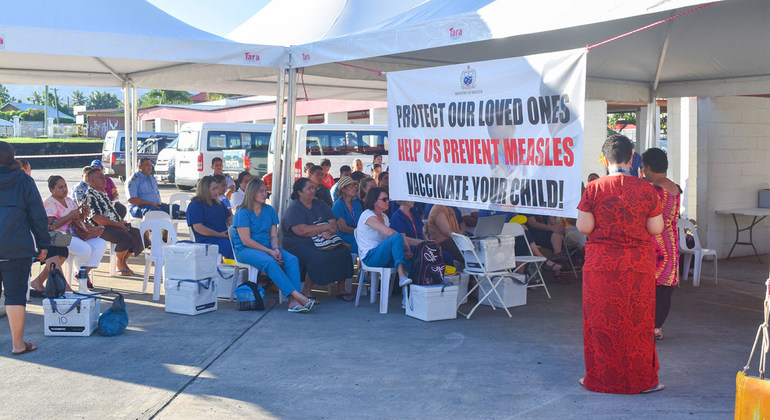Measles epidemic continues to grip Samoa, as WHO figures show impact of social media ‘misinformation campaigns’
In Samoa, the UN is leading efforts to counter a massive outbreak of measles which continues to spread, mainly among babies and children.
Since a state of emergency was declared on 15 November, there have been more than 4,200 cases on the tiny Pacific Ocean island nation, including 165 on Thursday alone.
According to the UN Resident Coordinator in Samoa, 62 people have died so far, the vast majority babies and young children.
Read more here.
And the epidemic on Samoa fits a worrying pattern identified by the World Health Organization (WHO) in its latest data on the spread of measles worldwide, published on Thursday.
“Misinformation campaigns” about the safety of the measles vaccine, have been spreading across social media, helping to fuel a major increase in the number of infections and deaths.
Get the global picture from our story, here.
At least 58 lives lost in boat tragedy off Mauritanian coast
At least 58 men, women and children have died after a vessel carrying around 150 migrants sank off the coast of Mauritania, UN migration agency IOM said on Thursday.
Eighty-three survivors, including at least 10 youngsters, swam to shore after Wednesday’s tragedy off the North African coast, and have been transferred to hospital, the International Organization for Migration (IOM) reported.
It says that the vessel left The Gambia eight days ago bound for the Canary Islands, before running low on fuel.
At the scene of the accident in the north of the country, IOM Mauritania Chief of Mission, Laura Lungarotti, said that the survivors were recovering from shock and that the injured were in hospital.
The UN agency has offered support by providing first aid kits, blankets and other supplies, and it has also sent a doctor to support the response.
Partnerships key to taking landlocked countries out of poverty: UN Chief
The challenges faced by landlocked developing countries (LLDCs), some of the poorest in the world, can be overcome through more effective partnerships, UN Secretary-General António Guterres declared on Thursday, at a conference held at UN Headquarters in New York.
The Midterm Review of the 10-year Vienna Programme of Action For Landlocked Countries, is an opportunity for the international community to renew commitments made, to lifting LLDCs out of poverty.
Click here for our full coverage.
UN chief lauds volunteerism as ‘powerful mechanism’ towards sustainable development
The 2030 Agenda calls for a just, equitable, tolerant and socially inclusive world in which the needs of the most vulnerable are met. International Volunteer Day (IVD) celebrates that by letting people make “meaningful contributions to more inclusive and equalitarian societies” through volunteering, according to Secretary-General António Guterres.
“Volunteerism is a powerful mechanism to engage people, especially those left farthest behind, in achieving the Sustainable Development Goals (SDGs), the UN chief said in his message for the day. “When people volunteer, they connect with others and foster a sense of purpose”.
By voluntary actions, people on the margins can become more included in societies.
And in refugee camps throughout the globe, displaced people themselves are volunteering for children’s education and better intercultural understanding.
In addition to increasing the number of UN Volunteers to contribute to the UN system activities in support of Agenda 2030, Mr. Guterres maintains that we must continue to promote volunteerism worldwide “as it nurtures solidarity and cohesion through underlying values of cooperation and reciprocity”.
“Volunteerism is essential to ensure that global sustainable development efforts are owned by all people, implemented by all people and for all people”, concluded the Secretary-General.
For more on volunteerism, listen to what Naoual Driouich, chief of UN System Affairs and New York Office of UN Volunteers, has to say:
Flooding in South Sudan prompts stepped-up UN response
Since July, more than 900,000 people have been impacted by heavy rainfall and flooding in South Sudan, prompting a stepped-up response by the UN and its partners.
According to the UN Office for the Coordination of Humanitarian Affairs (OCHA), as of last week, 7,000 metric tons of food have been distributed, reaching more than 700,000 people.
And emergency kits have helped 9,000 households, with 12,000 additional households set to receive them soon.
Aid workers are using planes and waterways to access hard-to reach locations and are repairing roads, with the support of local communities.
While UN Emergency Relief Coordinator Mark Lowcock released $15 million from the Central Emergency Response Fund last month, an additional $10 million was allocated from the South Sudan Humanitarian Fund.
But the humanitarian crisis in South Sudan remains severe, with 7.5 million people in need of aid due to conflict, chronic vulnerabilities and a lack of essential services.
2.3 million people in Zambia facing food insecurity
Zambia has been added to the list of countries where the lack of food has reached crisis levels, the UN’s Food and Agricultural Organization said on Thursday.
Citing reduced harvests and high food prices in southern and western areas, the FAO reported that an estimated 2.3 million people are food insecure, more than 10 per cent of the population.
Zambia’s addition to the UN list means that more than 40 countries are today in need of external food assistance, 32 of them are in Africa.
In December 2010, FAO listed 29 countries requiring help, 20 of them African.
Listen to or download our audio News in Brief for 5 December on SoundCloud:









